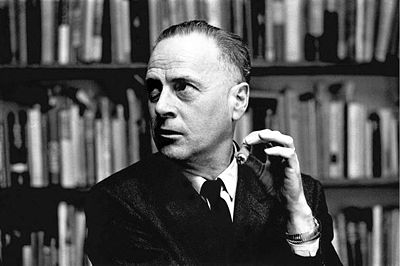Marshall McLuhan
From DigitalRhetoricCollaborative

Contents |
Marshall McLuhan[1] was a Canadian philosopher and father to the study of the digital media generation. He is considered one of the most influential and controversial intellectuals in the new wave of academic and technological understanding. He noted that the differences in human perspectives are not solely judged upon ideas, but that technology plays a role as well."The medium is the message" [2] is the most notorious phrase created by McLuhan to summarize his ideals about the role of a message and its relationship with the choice of medium. McLuhan stressed the importance of understanding
Background
"Herbert Marshall McLuhan" was born in Edmonton, Alberta, Canada on July 21, 1911. McLuhan passed away from in Toronto, Ontario, Canada on December 31, 1980.
Education
Marshall graduated with a B.A. from the University of Maitobe in 1932 and a M.A. in 1934. He then continued his graduate studies at the University of Cambridge, receiving his Ph.D. in Literature in 1942.
Career
Marshall's first teaching position was at the University of Wisconsin, Madison from 1936-1937. After a year, he taught at St. Louis University from 1937-1944. He accepted a position at Assumption University from 1944-1946. Marshall became an official professor in 1952 amidst his time teaching at St. Michael's College, University of Toronto from 1946-1979.
Centre for Culture and Technology
McLuhan and his oldest son, Eric McLuhan, worked together to create a construction of his ideas. The ideas were organized and grouped into the "4 Laws of Media" [2]: every technology
- 1) amplifies part of our culture
- 2) obsolesces aspects previously amplified
- 3) retrieves elements previously obsolesced
- 4) eventually reverses or "flips" into something else entirely.
Published Works
- The Mechanical Bride: Folklore of Industrial Man (1951) [3]
- The Gutenberg Galaxy: The Making of Topographic Man (1962) [4]
- Understanding Media: The Extensions of Man (1964) [5]
- The Medium is the Massage: An Inventory of Effects (1967) [6]
- War and Peace in the Global Village (1968) [7]
- Culture is Our Business (1970) [8]
- From Cliché to Archetype (1970) [9]
Awards
Albert Schweitzer Chair in the Humanities at Fordham University (1967-68) Molson Award for Outstanding Achievement in the Social Sciences (1967) Companion of the Order of Canada (1970) Gold Medal Award from President of the Italian Republic (in recognition of original work as philosopher of the mass media, 1971) Vatican appointment as Consultor of the Pontifical Commission for Social Communications (1973)
Personal Life
McLuhan married Corinne Keller Lewis in 1939. They have two sons and four daughters: Eric, Mary, Theresa, Stephanie, Elizabeth, and Michael. [3]
References
- ↑ https://verbooom.wordpress.com/2012/12/11/understanding-the-philosophy-of-marshall-mcluhan/
- ↑ http://www.nndb.com/people/869/000047728/
- ↑ http://www.nndb.com/people/869/000047728/
External Links
1. http://www.marshallmcluhan.com/
2. http://en.wikipedia.org/wiki/The_medium_is_the_message
3. http://www.marshallmcluhan.com/biography/
4. http://en.wikipedia.org/wiki/The_Mechanical_Bride:_Folklore_of_Industrial_Man
5. http://en.wikipedia.org/wiki/The_Gutenberg_Galaxy
6. http://en.wikipedia.org/wiki/Understanding_Media
7. http://en.wikipedia.org/wiki/The_Medium_Is_the_Massage
8. http://en.wikipedia.org/wiki/War_and_Peace_in_the_Global_Village
9. http://www.amazon.com/Culture-Our-Business-Marshall-McLuhan/dp/1625648286
10. http://en.wikipedia.org/wiki/From_Clich%C3%A9_to_Archetype
